Information injection-pump assembly
ZEXEL
106873-7251
1068737251
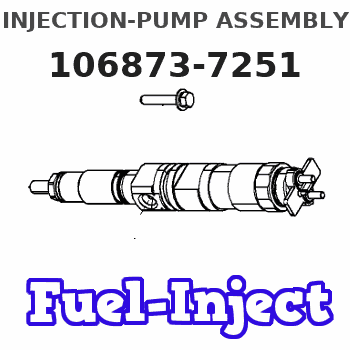
Rating:
Service parts 106873-7251 INJECTION-PUMP ASSEMBLY:
1.
_
7.
COUPLING PLATE
8.
_
9.
_
11.
Nozzle and Holder
ME093733
12.
Open Pre:MPa(Kqf/cm2)
15.7{160}/21.6{220}
14.
NOZZLE
Include in #1:
106873-7251
as INJECTION-PUMP ASSEMBLY
Cross reference number
ZEXEL
106873-7251
1068737251
Zexel num
Bosch num
Firm num
Name
106873-7251
INJECTION-PUMP ASSEMBLY
Calibration Data:
Adjustment conditions
Test oil
1404 Test oil ISO4113 or {SAEJ967d}
1404 Test oil ISO4113 or {SAEJ967d}
Test oil temperature
degC
40
40
45
Nozzle and nozzle holder
105780-8250
Bosch type code
1 688 901 101
Nozzle
105780-0120
Bosch type code
1 688 901 990
Nozzle holder
105780-2190
Opening pressure
MPa
20.7
Opening pressure
kgf/cm2
211
Injection pipe
Outer diameter - inner diameter - length (mm) mm 8-3-600
Outer diameter - inner diameter - length (mm) mm 8-3-600
Overflow valve
131425-0220
Overflow valve opening pressure
kPa
157
123
191
Overflow valve opening pressure
kgf/cm2
1.6
1.25
1.95
Tester oil delivery pressure
kPa
255
255
255
Tester oil delivery pressure
kgf/cm2
2.6
2.6
2.6
Direction of rotation (viewed from drive side)
Right R
Right R
Injection timing adjustment
Direction of rotation (viewed from drive side)
Right R
Right R
Injection order
1-2-7-3-
4-5-6-8
Pre-stroke
mm
3.9
3.85
3.95
Beginning of injection position
Governor side NO.1
Governor side NO.1
Difference between angles 1
Cyl.1-2 deg. 45 44.5 45.5
Cyl.1-2 deg. 45 44.5 45.5
Difference between angles 2
Cal 1-7 deg. 90 89.5 90.5
Cal 1-7 deg. 90 89.5 90.5
Difference between angles 3
Cal 1-3 deg. 135 134.5 135.5
Cal 1-3 deg. 135 134.5 135.5
Difference between angles 4
Cal 1-4 deg. 180 179.5 180.5
Cal 1-4 deg. 180 179.5 180.5
Difference between angles 5
Cal 1-5 deg. 225 224.5 225.5
Cal 1-5 deg. 225 224.5 225.5
Difference between angles 6
Cal 1-6 deg. 270 269.5 270.5
Cal 1-6 deg. 270 269.5 270.5
Difference between angles 7
Cal 1-8 deg. 315 314.5 315.5
Cal 1-8 deg. 315 314.5 315.5
Injection quantity adjustment
Adjusting point
-
Rack position
11.6
Pump speed
r/min
700
700
700
Each cylinder's injection qty
mm3/st.
116
112.5
119.5
Basic
*
Fixing the rack
*
Standard for adjustment of the maximum variation between cylinders
*
Injection quantity adjustment_02
Adjusting point
Z
Rack position
8+-0.5
Pump speed
r/min
480
480
480
Each cylinder's injection qty
mm3/st.
14
11.9
16.1
Fixing the rack
*
Standard for adjustment of the maximum variation between cylinders
*
Injection quantity adjustment_03
Adjusting point
A
Rack position
R1(11.6)
Pump speed
r/min
700
700
700
Average injection quantity
mm3/st.
116
115
117
Basic
*
Fixing the lever
*
Injection quantity adjustment_04
Adjusting point
B
Rack position
R1+1.2
Pump speed
r/min
1100
1100
1100
Average injection quantity
mm3/st.
123.5
119.5
127.5
Fixing the lever
*
Injection quantity adjustment_05
Adjusting point
C
Rack position
(R1-0.55
)
Pump speed
r/min
500
500
500
Average injection quantity
mm3/st.
112.5
108.5
116.5
Fixing the lever
*
Timer adjustment
Pump speed
r/min
900--
Advance angle
deg.
0
0
0
Remarks
Start
Start
Timer adjustment_02
Pump speed
r/min
850
Advance angle
deg.
0.5
Timer adjustment_03
Pump speed
r/min
1100
Advance angle
deg.
3
2.5
3.5
Remarks
Finish
Finish
Test data Ex:
Governor adjustment
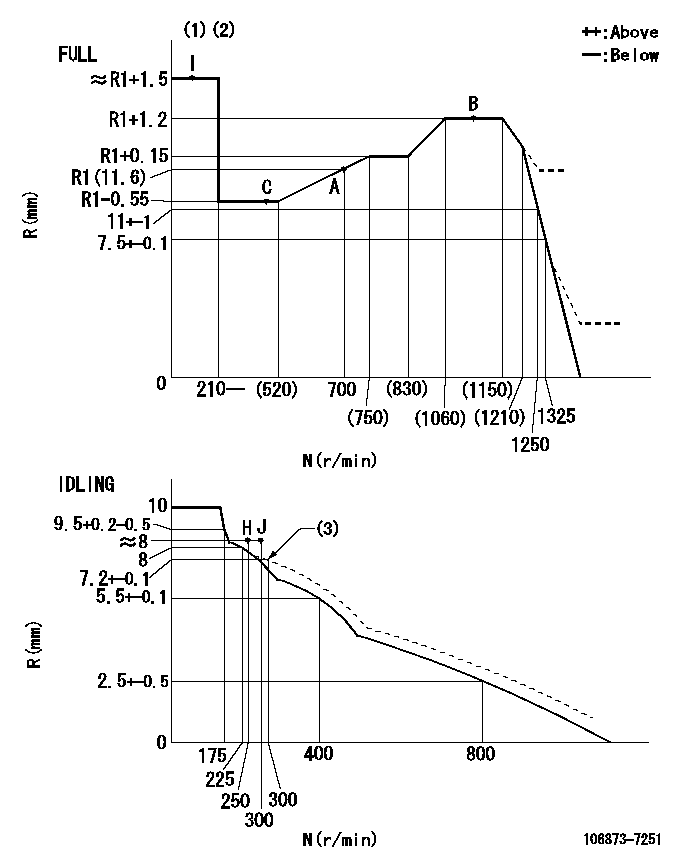
N:Pump speed
R:Rack position (mm)
(1)Torque cam stamping: T1
(2)Tolerance for racks not indicated: +-0.05mm.
(3)Damper spring setting
----------
T1=AC91
----------
----------
T1=AC91
----------
Speed control lever angle
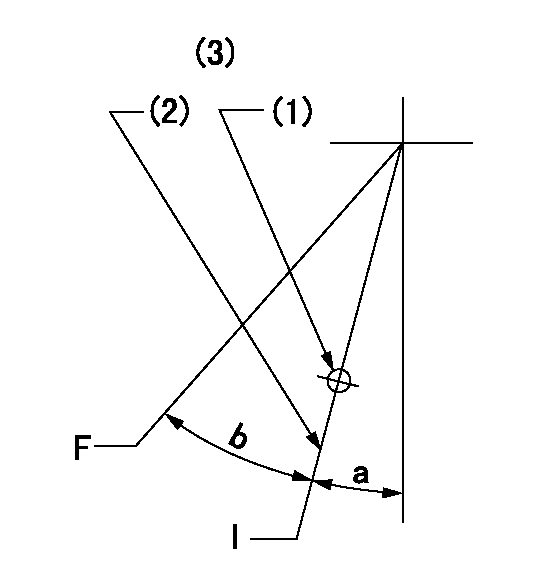
F:Full speed
I:Idle
(1)Use the hole at R = aa
(2)Stopper bolt set position 'H'
(3)Viewed from feed pump side.
----------
aa=37.5mm
----------
a=32deg+-5deg b=35.5deg+-3deg
----------
aa=37.5mm
----------
a=32deg+-5deg b=35.5deg+-3deg
Stop lever angle
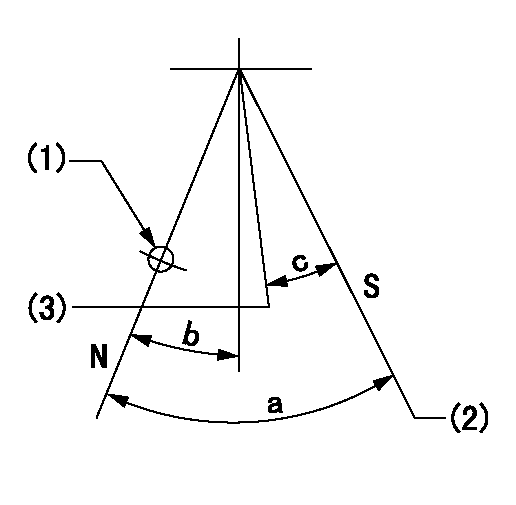
N:Pump normal
S:Stop the pump.
(1)Use the hole at R = aa
(2)Set the stopper bolt so that speed = bb and rack position = cc. (Confirm non-injection.)
(3)Normal engine position (equivalent to R = dd).
----------
aa=54mm bb=1100r/min cc=3+-0.3mm dd=17.5mm
----------
a=41deg+-5deg b=5.5deg+-5deg c=(31deg)
----------
aa=54mm bb=1100r/min cc=3+-0.3mm dd=17.5mm
----------
a=41deg+-5deg b=5.5deg+-5deg c=(31deg)
0000001501 MICRO SWITCH
Adjustment of the micro-switch
Adjust the bolt to obtain the following lever position when the micro-switch is ON.
(1)Speed N1
(2)Rack position Ra
----------
N1=335r/min Ra=7.9+-0.1mm
----------
----------
N1=335r/min Ra=7.9+-0.1mm
----------
Timing setting
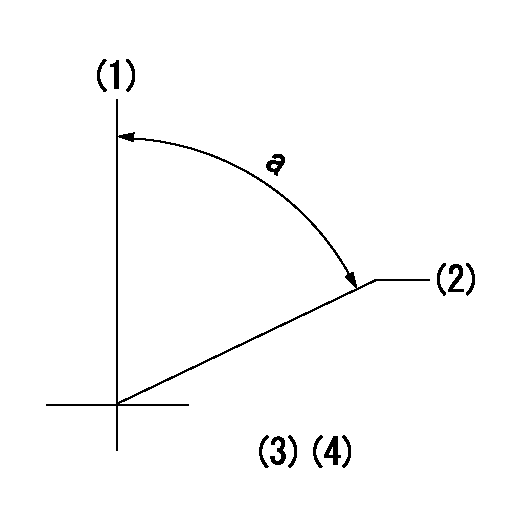
(1)Pump vertical direction
(2)Coupling's key groove position at No 1 cylinder's beginning of injection
(3)B.T.D.C.: aa
(4)-
----------
aa=10deg
----------
a=(40deg)
----------
aa=10deg
----------
a=(40deg)
Information:
Keypad
Keypad (6) is used to control the information that is shown on upper display (4) and lower display (5). The seven keys have two sets of functions, normal functions and service functions. For a description of the service functions of the keys; see the topic Service Mode. The normal functions of the keys are: Left Key- This key only functions when the GSC is in service mode. See the topic Service Mode. Phase Select Key- Selects which phase of the generator output is shown on the GSC. Pressing this key allows the operator to check the voltage, current, and frequency of each phase one at a time. Engine Meter Key- Stops the scrolling of engine conditions on lower display (5) and continuously shows the value for one particular engine condition. The pointer flashes to indicate scrolling is stopped. Pressing the key again, resumes the scrolling of engine conditions. Lamp Test Key- Performs a lamp test on the GSC and the optional alarm module. On the GSC the eight fault indicators are ON continuously, every segment of upper display (4) and lower display (5) are ON. On the optional alarm module all of the indicators are ON and the horn sounds. Alarm Codes Key- If the fault alarm indicator (3) is FLASHING, pressing this key causes the upper display (4) to show the corresponding alarm fault code. Pressing this key again, resumes the showing of generator output information on the upper display (4). If the fault alarm indicator (3) is OFF, this key has no function. For more information on alarm fault codes, see the topic Fault Description. Exit Key- This key only functions when the GSC is in service mode. See the topic Service Mode. Service Mode Key- Pressing this key causes the GSC to enter service mode. See the topic Service Mode.Engine Protection Controls
Engine and generator operating conditions and parameters are monitored and displayed on the Generator Set Control (GSC) Panel. The GSC detects faults that are alarm and shutdown conditions.The engine will continue to run when an alarm condition fault is displayed. The engine will automatically shut down if one of the following faults is detected and displayed.* Low oil pressure,* High coolant temperature,* Engine overspeed,* Low coolant level (if provided),* Engine overcrank.The activation of the Emergency Stop Push Button (ESPB) is also provided on the control panel.Fault Indicators
The eight fault indicators, located on the front of the GSC, are used to show and describe a fault that is present. * The yellow fault alarm indicator flashes when the GSC detects a fault that is an alarm condition. The engine continues to run and start. The fault alarm indicator is accompanied by an alarm fault code that is shown on the upper display when the Alarm Codes Key is pressed. Refer to Service Manual SENR5827 for fault code descriptions. * A red fault shutdown indicator flashes when the GSC detects a fault that is a shutdown condition. The engine is shutdown if it is running
Keypad (6) is used to control the information that is shown on upper display (4) and lower display (5). The seven keys have two sets of functions, normal functions and service functions. For a description of the service functions of the keys; see the topic Service Mode. The normal functions of the keys are: Left Key- This key only functions when the GSC is in service mode. See the topic Service Mode. Phase Select Key- Selects which phase of the generator output is shown on the GSC. Pressing this key allows the operator to check the voltage, current, and frequency of each phase one at a time. Engine Meter Key- Stops the scrolling of engine conditions on lower display (5) and continuously shows the value for one particular engine condition. The pointer flashes to indicate scrolling is stopped. Pressing the key again, resumes the scrolling of engine conditions. Lamp Test Key- Performs a lamp test on the GSC and the optional alarm module. On the GSC the eight fault indicators are ON continuously, every segment of upper display (4) and lower display (5) are ON. On the optional alarm module all of the indicators are ON and the horn sounds. Alarm Codes Key- If the fault alarm indicator (3) is FLASHING, pressing this key causes the upper display (4) to show the corresponding alarm fault code. Pressing this key again, resumes the showing of generator output information on the upper display (4). If the fault alarm indicator (3) is OFF, this key has no function. For more information on alarm fault codes, see the topic Fault Description. Exit Key- This key only functions when the GSC is in service mode. See the topic Service Mode. Service Mode Key- Pressing this key causes the GSC to enter service mode. See the topic Service Mode.Engine Protection Controls
Engine and generator operating conditions and parameters are monitored and displayed on the Generator Set Control (GSC) Panel. The GSC detects faults that are alarm and shutdown conditions.The engine will continue to run when an alarm condition fault is displayed. The engine will automatically shut down if one of the following faults is detected and displayed.* Low oil pressure,* High coolant temperature,* Engine overspeed,* Low coolant level (if provided),* Engine overcrank.The activation of the Emergency Stop Push Button (ESPB) is also provided on the control panel.Fault Indicators
The eight fault indicators, located on the front of the GSC, are used to show and describe a fault that is present. * The yellow fault alarm indicator flashes when the GSC detects a fault that is an alarm condition. The engine continues to run and start. The fault alarm indicator is accompanied by an alarm fault code that is shown on the upper display when the Alarm Codes Key is pressed. Refer to Service Manual SENR5827 for fault code descriptions. * A red fault shutdown indicator flashes when the GSC detects a fault that is a shutdown condition. The engine is shutdown if it is running
Have questions with 106873-7251?
Group cross 106873-7251 ZEXEL
Mitsubishi
Mitsubishi
Mitsubishi
Mitsubishi
106873-7251
INJECTION-PUMP ASSEMBLY